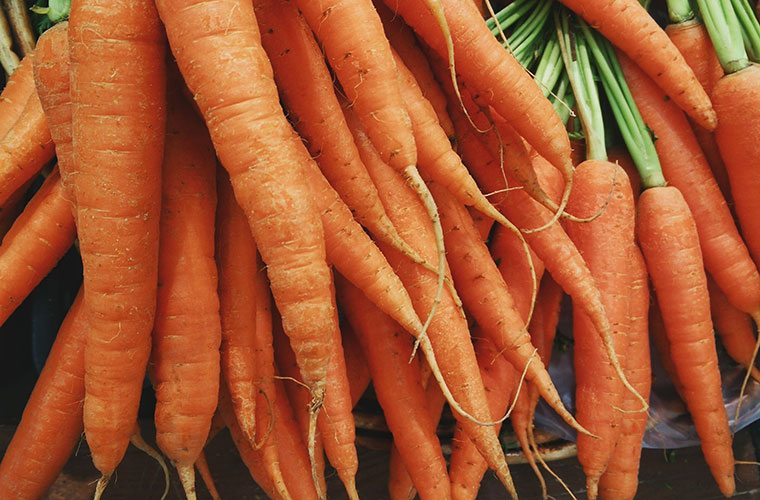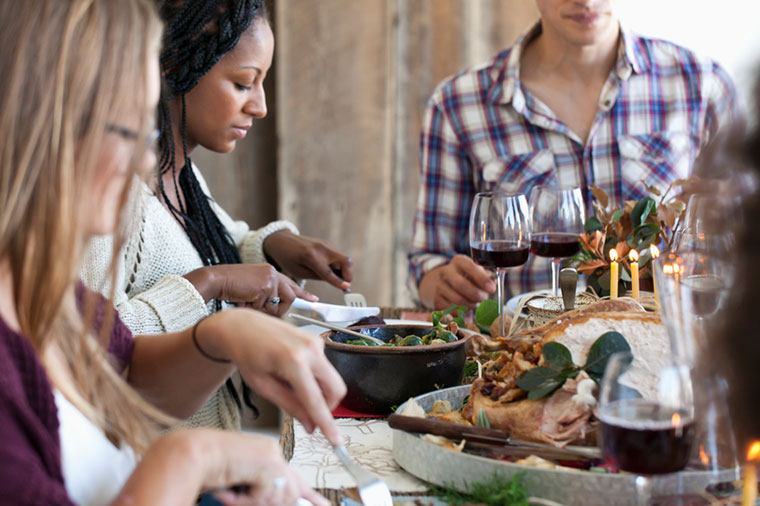Why You Overeat When You’re Stressed—and How to Break the Cycle
When your boss’ unrealistic demands, or your recent breakup, or the dinner you agreed to host for your family is stressing you out, there’s something about shoveling cookie dough into your mouth that can seem so satisfying. (Hey, it's dairy-free!) The problem is, chasing your sorrows with sugar and salt makes you feel worse almost instantly.
Emotional eating is a complicated cycle that’s tough to break. It’s also a cycle that’s pretty common. In a 2013 study, the American Psychological Association found that 38 percent of adults surveyed had overeaten or eaten unhealthy foods in the past month due to stress. Half of these people said they did so at least weekly.
Using food to deal with stress keeps you from addressing what’s really bothering you and figuring out how you might fix it.
“There’s a sort of desperation: ‘I have to handle this somehow and food is right there,’” best-selling author and teacher Geneen Roth says. “And not only that, [food] doesn’t talk back; it doesn’t get drunk; it doesn’t go away; it doesn’t abuse; it’s always available; and it’s cheaper than asking for help.”
According to Roth, who specializes in eating disorders, using food to deal with stress keeps you from addressing what’s really bothering you and figuring out how you might fix it. It’s an overarching theme in her latest book, This Messy Magnificent Life, due out in March. “The core of all of this isn’t so much about the relationship with food as it is about what is driving the relationship with food,” Roth says.
So, how do you figure out what’s driving that relationship and learn to put the cookies down before the shoveling starts? Here are a few things to keep in mind.

1. There’s a reason you don’t drown your sorrows in carrot sticks
Unfortunately for your health, cake seems like a lot more of a treat than celery. You tend to gravitate toward the bad stuff when stress hits, Roth says, partly because you see it as a sort of reward. And biology doesn’t help the situation.
Sugar has been shown to turn down stress-related hormones, for example, making you more susceptible to a pastry binge when you're stressed. Those stress hormones also ramp up your cortisol levels, which, in turn, can ramp up your appetite. Plus, because our ancestors needed fat and calories to survive a harsh winter or not-so-fruitful hunt, our bodies are still programmed to seek out high calorie foods—only in our case, that usually means Quarter Pounders with cheese. In other words, stress makes us crave the comfort food our body naturally looks for even harder.

{{post.sponsorText}}
2. Food can be like a drug
There’s a good chance you already know that heading to the pantry after a long day isn't the healthiest habit—but that doesn't make it any easier to queue up a Headspace meditation instead. Emotional eating can be like a drug that way, Roth says. “You sort of know that this isn’t the most effective way [to deal with your emotions]. It’s not really calming except in a moment,” she says.
Like any addiction, using (in this case, snacking) can inevitably lead to a cycle of shame, guilt, and more using. In the American Psychological Association survey, 49 percent of adults surveyed reported feeling disappointed in themselves after overeating or eating unhealthy foods, 46 percent said they felt bad about their bodies afterward, and 36 percent said they felt sluggish or lazy. Cue more self-loathing and, you guessed it, more eating.

3. Food isn't the answer—and it's also not the real problem.
Listening to what your body is telling you isn’t something you’re taught well, Roth says. “[You’re] eating from needs that have nothing to do with your body but have much more to do with your mind, with stress, with your feelings—using food in many ways to soothe or comfort or numb what you believe cannot be soothed or comforted or numbed any other way,” Roth says.
But guess what? You won't find the answers you need at the bottom of a bag of Pirate's Booty. In order to find meaningful solutions, however, you need to dig down to the root of the problem. “If you were using food to get your own attention, if it was a cry for help, what would that cry be?” Roth says. “What would you want to know? What’s your body trying to tell you?” Once you get a sense of what you’re actually craving—human connection, space, stimulation, quiet—you can get to work figuring out how to satisfy that desire in a healthier way.
4. Feeling discomfort won’t kill you
Feeling bad, well, doesn’t feel good. But trying to avoid all negative emotions is not only impossible, it's one of the main reasons stress-eating shame-spirals can spin out of control. “The problem with turning to food to deal with uncomfortable feelings, which so many of us do, is you still have the uncomfortable feelings and now you have feelings of shame and guilt added on top of those,” Roth says. “It’s not like it actually makes anything go away. It doubles it.” For the record, science backs this up.
In order to really get past it, you sometimes need to just face those uncomfortable feelings head-on for a while. What's easy to forget, Roth says, is that feelings pass.

5. Deprivation is not the answer
That being said, swearing off all edible goodies will almost certainly backfire. It’s okay to go slow. Shifting your behavior means thinking through what really is a treat, physically and emotionally. Sometimes it may be a cupcake, and you shouldn’t let that derail your progress. In fact, research has found that labeling something as "forbidden" only makes your brain focus on it more.
Brainstorm other ways of being kind to yourself, Roth says. Maybe that means reaching out to an old friend you haven’t talked to for a while, blocking off some alone time (even if it’s just escaping to the bathroom and shutting the door during an awkward family dinner), or filling your pantry with food you actually like that feels nourishing, not guilt-inducing. Whatever works for you, Roth says that focusing on the positive instead of talking down to yourself can get you into the right mindset. “The operative word here is kindness, it’s a sort of sweetness to yourself,” Roth says. “And then if you happen to binge, it’s how can you best take care of yourself afterwards and not cascade down that spiral of self-contempt?”
Another way to tamp down on overeating? Practice mindfulness. And if you're struggling with anxiety, here's why the ketogenic diet could be good for you.
Loading More Posts...